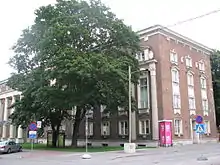Theatre NO99
Theatre NO99 was a theatre in Tallinn, Estonia that began to operate in February 2005. It was a state-owned repertoire theatre that has its own building with two theatre halls in central Tallinn. The theatre closed in 2019.

The name of the theatre was NO99, although it has no connection with classical No Theatre. NO is an abbreviation of the word “number” and 99 has decreased by one with each new production.
Description
The theatre’s artistic director was Tiit Ojasoo, and Ene-Liis Semper is the chief stage designer-director. The troupe consisted of 10 actors, eight men and two women. The theatre produced two to four new stage productions for the large hall every season. In addition, co-production projects (for example, with the theatre school) premiered in the small hall. Drama productions were staged primarily in the large hall. They aspired towards artistic exactingness and social relevance. Texts were often composed by the directors themselves (or in cooperation with actors). Adaptations of film screenplays have been produced on several occasions. In some cases, finished drama texts have also been brought to the stage. Some of the authors that have been produced are McDonagh, Kurosawa, Tarkovski, Jarry, Mishima, Chekhov, Shakespeare, and others.
In addition to productions in the large and small halls, plays have been staged in the open air as well: in an old swimming pool (Seven Samurais), and in three abandoned airplane hangars (King Ubu). The theatre also organised so called one-time "actions", in which the success or failure of a somewhat crazy idea is tested. In addition to Ojasoo and Semper, other Estonian directors also directed plays in the theatre, as do guests from abroad (for example, Sebastian Hartmann, Aleksander Pepeljajev). Guest actors from other theatres also participated in NO99 productions.
Awards
The theatre won several national and also international festival awards for productions, and for stage design and acting. Several productions have been invited to participate in international festivals in Austria (Wiener Festwochen), Germany, Russia, Switzerland, Poland, Russia, Finland, Lithuania, and other countries.
The theatre has also issued several publications as an extension of its activities.